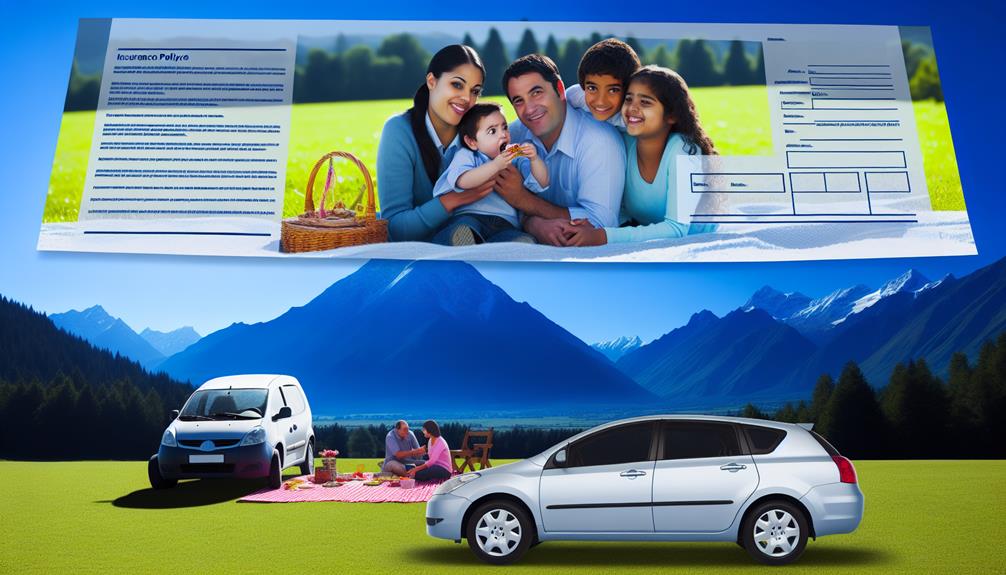Like the safety net of a seasoned acrobat, extensive car insurance policies can offer you a sense of security, especially when it comes to rental car coverage. You might think your personal auto policy is enough, but there are nuances that can leave you exposed to unexpected costs. Understanding what's included and what's not can make a significant difference in your overall protection. So, how do you navigate the intricacies of rental car insurance to make certain you're adequately covered when you're behind the wheel of a rental?
Key Takeaways
- Personal auto insurance may extend coverage to rental cars, including liability, comprehensive, and collision, but check for limits and exclusions.
- Rental car insurance, like Collision Damage Waiver, protects against damage costs, while liability coverage protects against third-party claims.
- Credit cards often provide secondary rental insurance when the rental is paid with that card; ensure to verify coverage specifics.
- Understanding state-specific insurance regulations is essential for compliance and avoiding potential legal issues while driving a rental car.
- Comparing insurance options between rental agencies can help find the best coverage and avoid unnecessary costs.
Understanding Rental Car Insurance
Understanding rental car insurance is vital for anyone planning to rent a vehicle. When you rent a car, you'll encounter various types of coverage options, including Collision Damage Waiver (CDW) and liability coverage. The CDW releases you from financial responsibility for damages to the rental car, which can save you a significant amount if an accident occurs. Liability coverage is equally important, as it protects you from damages or injuries you might cause to third parties while driving the rental.
Moreover, personal accident insurance can help cover medical expenses for you and your passengers in case of an accident. If you're worried about theft, personal effects coverage protects your belongings inside the rental vehicle. Before finalizing your rental, it's essential to review your existing auto insurance coverage. Many personal auto policies extend coverage to rental cars under the same limits and conditions, potentially saving you from purchasing additional insurance.
Coverage Under Personal Auto Insurance
When renting a vehicle, it is important to know how your personal auto insurance can provide coverage. If your personal auto insurance policy includes liability, all-encompassing, and collision coverage, it typically extends to rental cars as well. This means you'll have the same coverage limits and deductibles for the rental vehicle as you do for your own car.
However, it is vital to check for any exclusions or gaps in your personal auto insurance. Some policies may not cover rentals outside the U.S. or Canada, so if you're traveling abroad, you might need to purchase additional rental car insurance for sufficient protection.
Before you rent a car, verify the coverage details with your insurance provider. This step guarantees you understand what's included and whether you need any extra insurance. Knowing your coverage can save you money and prevent headaches later. By clarifying your personal auto insurance policy, you'll have peace of mind while driving your rental, allowing you to focus on enjoying your trip without worrying about potential liabilities.
Importance of Rental Car Insurance

Rental car insurance is fundamental for anyone looking to drive a rental vehicle, especially if you don't have personal auto insurance. Without this coverage, you risk facing significant out-of-pocket expenses for damages or liabilities that occur while you're driving. If you have a high deductible on your personal auto policy, rental car insurance becomes even more beneficial, as it helps you avoid those hefty costs in case of an accident.
This type of insurance provides essential protection against damages to the rental car and covers medical expenses for injuries sustained in an accident. If you only have liability insurance, your personal auto policy won't cover damages to rental cars, making additional rental insurance critical for thorough protection.
While many credit cards offer rental car insurance benefits, it's important to verify the coverage terms to confirm they meet your needs. You don't want to find yourself underinsured when you need it most. By opting for rental car insurance, you're taking a proactive step to safeguard yourself, your finances, and your travel experience. Remember, having this coverage protects you from unexpected costs and gives you peace of mind on the road.
Clarifications on Coverage Limitations
Maneuvering coverage limitations can be tricky, especially when it comes to rental cars. To avoid unexpected expenses, you need to understand the specifics of your personal policy. Here are some key points to take into account:
- Coverage Limits: Your personal auto policy's coverage limits apply to rental vehicles. If damages exceed these limits, you won't receive compensation.
- Exclusions: Some policies exclude high-value rental cars or those used for business purposes, so you might need additional coverage from the rental company.
- Negligence: If you're negligent—like driving under the influence or using the rental for illegal activities—your all-encompassing policy may deny coverage entirely.
- Specific Exclusions: Rental insurance can have particular exclusions, including off-road driving or geographical restrictions, which are essential to review before renting.
Resources for Insurance Information

Maneuvering the world of car insurance can feel overwhelming, but plenty of resources can simplify the process for you. Various guides offer detailed insights into auto insurance topics, especially regarding all-encompassing car insurance policies with rental car coverage. Websites like "Best Car Insurance Companies" and "Cheapest Car Insurance Companies" can help you identify top-rated and budget-friendly options for your insurance needs.
To find competitive rates and understand the coverage options available for rental cars, check out tools that allow you to compare car insurance rates and quotes. These resources enable you to see how different insurance policies stack up against each other, making your decision easier. Additionally, an "Insurance Glossary" can clarify key terms related to rental car insurance and all-encompassing policies, empowering you to make informed choices.
For trustworthy recommendations, look into rankings by U.S. News & World Report, which evaluates insurance companies using unbiased methodologies. This can be particularly helpful if you're seeking rental car coverage through all-encompassing policies. With these resources at your fingertips, maneuvering the complexities of auto insurance cover will be much simpler.
Credit Card Coverage for Rentals
Many people don't realize that credit cards can provide valuable coverage for rental cars when you pay for the rental with that card. Most credit card companies offer rental car insurance, typically covering collision damage and theft protection. However, there are important things to keep in mind:
- Secondary Coverage: Credit card rental car insurance usually acts as secondary coverage, meaning it kicks in after your personal auto insurance is exhausted.
- Declining CDW: To activate this coverage, you may need to decline the rental company's collision damage waiver (CDW).
- Check Eligibility: Not all credit cards provide this insurance, so it's vital to verify your card's coverage before renting.
- Review Terms: Coverage specifics, including limits and exclusions, vary by credit card issuer, so always review the terms and conditions beforehand.
Cost Considerations for Rental Insurance

When renting a car, understanding the cost considerations for rental insurance is essential to avoid unexpected expenses. Daily rates for basic Collision Damage Waiver (CDW) coverage can range from $10 to $30, which adds a significant amount to your rental cost. If you opt for liability insurance, that'll likely set you back an additional $10 to $20 per day, depending on the coverage limits you choose. Don't forget about Personal Accident Insurance, which covers medical expenses for you and your passengers, typically costing between $1 to $5 daily.
As you evaluate your rental car insurance options, keep in mind that the total cost can quickly escalate with multiple add-ons, potentially doubling your initial rental fee. To save some money, check your existing personal auto insurance and any credit card benefits you may have. Many times, you might already have adequate coverage, allowing you to skip unnecessary expenses at the rental counter. By being aware of these cost considerations, you can make informed decisions and enjoy your rental experience without financial surprises.
Regulatory Environment and Requirements
Steering through the landscape of rental car insurance requires not just an understanding of costs but also awareness of the regulatory environment and requirements that vary by state. Each state has its own insurance requirements that can greatly impact your rental experience. Here are four key points to keep in mind:
- Minimum Liability Coverage: Some states mandate minimum liability coverage for rental cars. Be sure to check your state's laws.
- Personal Auto Insurance: If you have personal auto insurance, it often extends to rental cars, covering them under the same limits and deductibles as your own vehicle.
- Lack of Personal Coverage: If you don't have personal auto insurance, you'll need to purchase liability coverage from the rental company to comply with state regulations.
- Varied Rental Options: Not all rental agencies provide the same insurance options, so it's crucial to understand what's available and required in your area.
Staying informed about these regulations guarantees you have adequate protection and compliance while enjoying your rental car.
Frequently Asked Questions
What Are the Exclusions for Car Rental Insurance?
When you rent a car, there are several exclusions you should be aware of. Most rental car insurance won't cover damages if you drive under the influence or if the vehicle suffers wear and tear. If you use the car for commercial purposes or racing, you'll likely void any coverage. Additionally, personal items stolen from the car aren't covered; your homeowners or renters insurance may be the better option for that.
Does Allstate Cover Rental Cars When the Car Breaks Down?
Isn't it ironic? You rely on your car, and the moment it breaks down, you might find yourself without a backup plan. Allstate could cover rental cars if your vehicle's in for repairs, but it depends on your specific policy. You'll want to check your coverage details and limits. It's wise to contact your Allstate agent to clarify what's included, so you're not left stranded without wheels when you need them most.
Does Umbrella Insurance Cover a Rental Car?
Umbrella insurance doesn't cover rental cars directly. It provides additional liability protection beyond your auto policy limits, meaning it could help if you're liable for damages or injuries while driving a rental, but only after your auto policy's limits are exhausted. It's essential to check your umbrella policy's specifics, as coverage can vary. For damage to the rental car itself, you'll need to rely on your personal auto insurance or purchase rental insurance.
Does My Car Insurance Cover Rental Cars Internationally?
Your car insurance might not cover rental cars internationally. Most policies only provide coverage in the U.S. and Canada, leaving you exposed when traveling abroad. It's crucial to check with your insurer to understand your specific coverage options. Some countries require additional insurance that your policy may not include. To guarantee you're protected, consider purchasing insurance directly from the rental company or a travel insurance provider for your trip.
